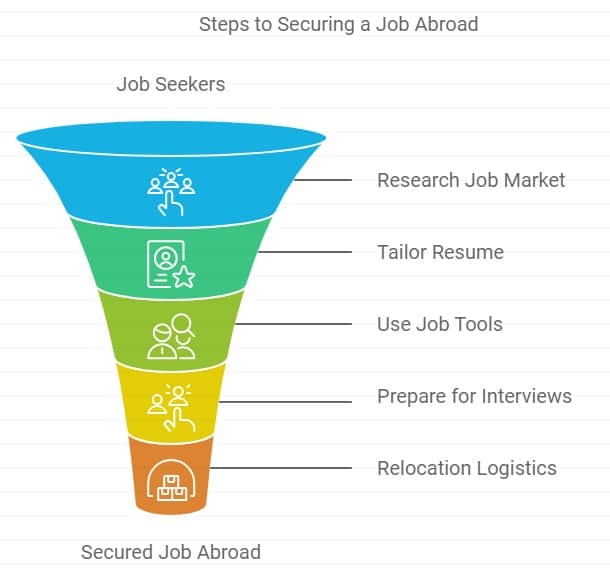Securing a job in a foreign country is a dream for many professionals. It opens doors to new experiences, opportunities for career growth, and a chance to immerse yourself in a different culture. However, the process of finding and landing a job abroad can be daunting, and there are several common mistakes that people make along the way.
This guide will walk you through the essential steps to successfully land a job in a foreign country and highlight the common pitfalls to avoid. Whether you’re targeting roles in Europe, the Middle East, or elsewhere, the following tips will help you navigate the job search process with confidence.

Main Highlights of Content
Toggle1. Research the Job Market and Visa Requirements
The first step in getting a job abroad is to research the job market in your chosen destination. Different countries have different demands for skilled workers, so it’s important to target countries where your skills are in demand.
How to Research the Job Market:
- Look for High-Demand Sectors: Start by identifying which industries are booming in your target country. For example, tech, healthcare, and engineering jobs are in high demand in many European and Gulf countries.
- Understand Visa Requirements: Each country has its own visa process for foreign workers. Research whether you qualify for work visas, such as the EU Blue Card in Europe or specialized work visas in the Middle East.
Common Mistakes to Avoid:
- Ignoring Visa Eligibility: One of the most common mistakes is applying for jobs without checking visa requirements. Always make sure that the job you’re targeting is open to foreigners and that the employer is willing to sponsor your visa.
For tips on optimizing your resume and applying for jobs in a foreign market, check out Free Resume Tools to ensure your resume meets international standards.
2. Tailor Your Resume and Cover Letter to the Country’s Standards
Once you have a target country and industry in mind, the next step is to tailor your resume and cover letter according to local preferences. Different countries have different expectations when it comes to resume formats, and what works in one country may not work in another.
How to Customize Your Resume:
- Follow Local Resume Formats: For example, some countries prefer resumes with a photo, while others don’t. In the UK, a CV is typically more detailed than a resume used in the US.
- Highlight International Experience: If you’ve worked with international teams or companies before, highlight that experience. Employers value candidates who are adaptable and have a global mindset.
Common Mistakes to Avoid:
- Using the Same Resume for Every Country: A one-size-fits-all resume won’t get you far when applying for jobs abroad. Tailor your resume for each country to increase your chances of getting noticed by hiring managers.
For more help crafting the perfect resume, use Free Resume Tools to ensure your resume is optimized for the job market you’re targeting.
3. Use Job Search Tools and Networks
One of the best ways to find a job abroad is to use international job boards and leverage your professional network. Many countries have dedicated platforms that list job opportunities for foreigners. Additionally, networking can play a crucial role in finding opportunities abroad.
How to Search for Jobs Internationally:
- Use Job Search Platforms: Websites like LinkedIn, Glassdoor, and Indeed offer international job listings. Some countries also have their own local job portals that you can explore.
- Network with Professionals: Join online communities or expat groups on social media platforms to connect with people already working in your target country. Networking can lead to referrals and job opportunities that aren’t advertised publicly.
Common Mistakes to Avoid:
- Relying Solely on Job Portals: While job boards are helpful, many jobs are filled through referrals and networking. Don’t just submit applications online—make sure to build a strong network of professionals who can help you.
Track all your job applications efficiently using a Job Application Tracker. It will help you stay organized and follow up on all your applications.
4. Leverage Google Search Operators for Targeted Job Searches
One overlooked tool for finding jobs abroad is Google Search Operators. These operators allow you to perform more specific job searches, helping you find openings that may not show up on traditional job boards.
How to Use Google Search Operators:
- Use Job-Related Keywords: Combine keywords like “jobs for foreigners” with specific countries or job titles to find listings relevant to you.
- Use Quotation Marks for Specific Searches: For example, if you’re looking for marketing jobs in Germany, search for
"marketing jobs in Germany"to narrow down your results. - Exclude Irrelevant Results: Use the minus operator (
-) to exclude results you don’t want. For example, you could search for"software developer jobs in France" -internshipto exclude internship listings.
Common Mistakes to Avoid:
- Relying on Generic Job Searches: Instead of using broad terms like “jobs abroad,” narrow your search using more specific keywords or operators. This will save time and help you find more relevant job openings.
To help you with customized searches, try the Google Search Operator Generator to refine your job search strategy.
5. Prepare for Remote Interviews and Cultural Differences
Securing a job in a foreign country will most likely require remote interviews. It’s important to be prepared for these interviews, both in terms of content and understanding the local work culture.
How to Succeed in Remote Interviews:
- Understand Cultural Differences: Research business etiquette and cultural norms in the country you’re applying to. In some countries, it’s common to have a casual, friendly tone in interviews, while others may expect a more formal approach.
- Showcase Your Adaptability: Employers want to know that you can adapt to a new environment. Be sure to mention your openness to learning and experiencing new cultures.
Common Mistakes to Avoid:
- Not Researching the Company’s Culture: If you fail to demonstrate an understanding of the local culture during your interview, it could harm your chances. Always do thorough research before your interview.
6. Be Prepared for Relocation Logistics
Once you’ve secured a job offer, the final step is to handle the logistics of relocating to a foreign country. This includes securing housing, understanding tax obligations, and preparing for any cultural adjustments.
Tips for Relocation:
- Plan for Housing: Research housing options in your new country. In some places, employers may offer assistance with finding housing, while in others, you’ll need to secure accommodation on your own.
- Understand Tax Laws: Be aware of how taxes work in the country you’re moving to. Some countries have tax treaties with the US that prevent double taxation, but it’s important to know the specifics.
- Learn Basic Language Skills: If you’re moving to a country where English isn’t widely spoken, learning the basics of the local language can help you settle in more quickly.
Common Mistakes to Avoid:
- Neglecting Tax and Legal Obligations: Many job seekers overlook the legalities of working abroad. Make sure you understand both your home country’s and your host country’s tax and visa regulations before making the move.
Conclusion
Finding a job in a foreign country is an exciting yet challenging journey. By doing thorough research, tailoring your resume, using advanced search tools, and preparing for cultural differences, you can increase your chances of success. Avoid common mistakes like using a generic resume, ignoring visa requirements, or neglecting networking opportunities.
Make sure to leverage resources like Free Resume Tools, the Job Application Tracker, and the Google Search Operator Generator to streamline your job search and application process. By following these strategies and avoiding common pitfalls, you’ll be well on your way to securing a job in a foreign country and embarking on a new, fulfilling adventure.







